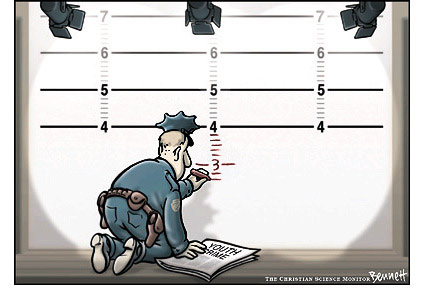APRIL 28, 2020 – Recently my wife observed that in these times the neighborhood sounds like the neighborhood of our childhood—ours, not our sons’. Young kids are playing outside, making lots of old-fashioned noise. My wife thinks this is good. I suppose so, except when I’m trying to read out on the porch and the kids across the alley are yelling and bouncing a basketball till my brain leaves its moorings.
But I notice too that if kids are outside playing hard, parental oversight is never distant. When kids in our neighborhood take flight on bikes, they ride in wide circles in front of their houses or in line with mom and dad, as the family in single file ventures all the way around the block.
Back when America was great, kids played mostly unsupervised, which allowed for great adventure and . . . troublemaking. Most of us survived.
My favorite brush with juvenile delinquency was vicarious, thanks to my younger sister when she was eight. One summer day she and her same-age-partner-in-crime, the preacher’s kid from up the street, were on the loose entirely unsupervised. Having exhausted their imaginations on non-destructive pursuits, they developed the bright idea of throwing rocks at the decorative streetlights that Fred M, our neighbor across the street, had campaigned hard for the town to install.
At each streetlight Jenny and Preacher’s Kid threw rocks until they achieved success, then proceeded to the next target.
That evening, Fred marched over to our yard, where Dad was running his daily weed inspection.
“Did you notice that some darn juvenile delinquents managed to bust every single streetlight along Rice Street?” Fred started in. He and Dad were close enough friends they didn’t need pleasantries to start up a conversation.
“No,” said Dad in disgust.
Fred called Dad’s attention to the broken light opposite our driveway, then pointed to the shattered lights in each direction up and down the street.
“For crying out loud,” Dad said. “Dja call the police?”
“Sure did,” said Fred, “but they’re lame as ever—said that unless we catch the hoodlums in the act, there’s nothin’ the cops can do. I say, arrest Roy T’s kid—everyone knows he’s the main troublemaker, at least on our side of town. That juvenile delinquent is headed for prison someday anyway. Why not give him a head start?”
“Well, whoever it was,” said Dad, “I’d sure like to meet the parents. I’d sit ’em down and read ’em the riot act. ‘What kind of parents are ya, anyway, that you’d teach your kid to do something like that?’ Then I’d have the kid and parents repair—and pay for—every one of those doggone lights.”
When my sister recently recounted her infamous escapade, she revealed that her partner-in-crime had caught hell from his dad (who somehow had found out), which, when you think about it, seemed appropriate, given the dad’s preacher status. Jenny went free as a bird, which was just as appropriate—Dad’s appellative of fondness for his ever-innocent daughter was “Jenny Wren.”
(Remember to subscribe to this blog and receive notifications of new posts by email.)
© 2020 by Eric Nilsson
